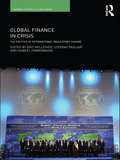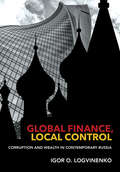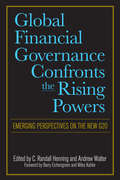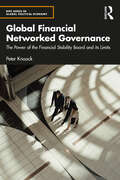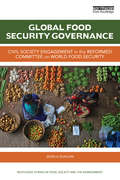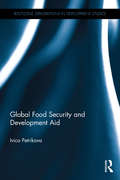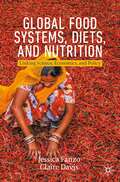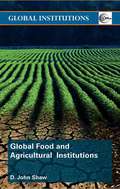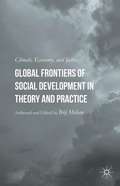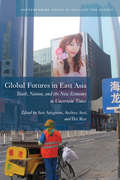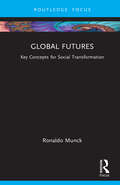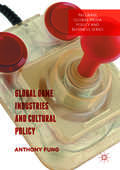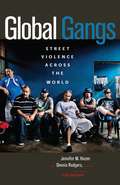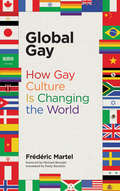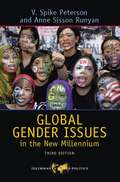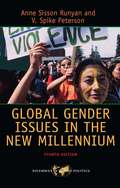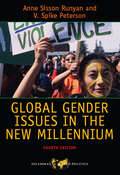- Table View
- List View
Global Finance in Crisis: The Politics of International Regulatory Change (Routledge Studies in Globalisation)
by Eric HelleinerFrom the vantage point of the key powers in global finance including the United States, the European Union, Japan, and China, this highly accessible book brings together leading scholars to examine current changes in international financial regulation. They assess whether the flurry of ambitious initiatives to improve and strengthen international financial regulation signals an important turning point in the regulation of global finance. The text: Examines the kinds of international reforms have been implemented to date and patterns of international regulatory change. Provides an analysis of change across a number of financial sectors, including the regulation of hedge funds, derivatives, credit rating agencies, accounting, and banks. Offers an explanation of contemporary regulatory developments with reference to inter-state power dynamics, domestic politics, transgovernmental networks, and/or transnational non-state forces. Providing the first systematic analysis of the international regulatory response to the current global financial crisis, this ground-breaking volume is vital reading for students and scholars of international political economy, international relations, global governance, finance and economics.
Global Finance, Local Control: Corruption and Wealth in Contemporary Russia (Cornell Studies in Money)
by Igor O. LogvinenkoExploring Russia's reentry into global capital markets at the dawn of the twenty-first century, Global Finance, Local Control shows how economic integration became deeply entangled with a bare-knuckled struggle for control over the vestiges of the Soviet empire. Igor Logvinenko reveals how the post-communist Russian economy became a full-fledged participant in the international financial sector without significantly improving the local rule of law.By the end of Vladimir Putin's second presidential term, Russia was more integrated into the global financial system than at any point in the past. However, the country's longstanding deficiencies—including widespread corruption, administration of justice, and an increasingly overbearing state—continued unabated. Scrutinizing stock-market restrictions on foreign ownership during the first fifteen years of Russia's economic transition, Logvinenko concludes that financial internationalization allowed local elites to raise capital from foreign investors while maintaining control over local assets. They legitimized their wealth using Western institutions, but they did so on their terms.Global Finance, Local Control delivers a somber lesson about the integration of emerging markets: without strong domestic rule-of-law protections, financial internationalization entrenches oligarchic capitalism and strengthens authoritarian regimes.
Global Financial Contagion
by Shalendra D. SharmaThis book is an authoritative account of the economic and political roots of the 2008 financial crisis. It examines why it was triggered in the United States, why it morphed into the Great Recession, and why the contagion spread with such ferocity around the globe. It also examines how and why economies - including the Eurozone, Russia, China, India, East Asia, and the Middle East - have been impacted and explores their response to the unprecedented challenges of the crisis and the effectiveness of their policy measures. Global Financial Contagion specifically looks at how the Obama administration's policy missteps have contributed to America's huge debt and slow recovery, why the Eurozone's response to its existential crisis has become a never-ending saga, and why the G-20's efforts to create a new international financial architecture may fall short. This book will long be regarded as the standard account of the crisis and its aftermath.
Global Financial Governance Confronts the Rising Powers: Emerging Perspectives on the New G20
by Andrew Walter C. Randall HenningGlobal Financial Governance Confronts the Rising Powers addresses the challenge that the rising powers pose for global governance, substantively and institutionally, in the domain of financial and macroeconomic cooperation. It examines the issues that are before the G20 that are of particular concern to these newly influential countries and how international financial institutions and financial standard-setting bodies have responded. With authors who are mainly from the large emerging market countries, the book presents rising power perspectives on financial policies and governance that should be of keen interest to advanced countries, established and evolving institutions, and the G20.
Global Financial Governance Confronts the Rising Powers: Emerging Perspectives on the New G20
by C. Randall Henning and Andrew WalterGlobal Financial Governance Confronts the Rising Powers addresses the challenge that the rising powers pose for global governance, substantively and institutionally, in the domain of financial and macroeconomic cooperation. It examines the issues that are before the G20 that are of particular concern to these newly influential countries and how international financial institutions and financial standard-setting bodies have responded. With authors who are mainly from the large emerging market countries, the book presents rising power perspectives on financial policies and governance that should be of keen interest to advanced countries, established and evolving institutions, and the G20.
Global Financial Integration Thirty Years On
by Geoffrey R. D. Underhill Jasper Blom Daniel MüggeA policy-relevant overview of the issues and problems involved in devising an effective global financial system for the future.
Global Financial Networked Governance: The Power of the Financial Stability Board and its Limits (RIPE Series in Global Political Economy)
by Peter KnaackGlobal Financial Networked Governance provides a careful analysis of the Financial Stability Board (FSB) and the standard-setters under its umbrella to show how such government networks harness the power of public reputation to herd their members into compliance. The FSB’s track record in coordinating global financial regulatory reform is uneven. Some items on its agenda have seen the rapid evolution of globally coordinated regulatory standards and their implementation by all member states, sometimes even ahead of the stipulated timelines. In contrast, other initiatives have stalled at different stages of the policymaking process, global coordination is lacking, deadlines have been missed, and it is currently unclear when the post-crisis financial reform project will come to completion, if ever. In this book, the author asks the question: why has the FSB succeeded in some areas of its global financial regulatory coordination work and not in others? The book traces the global policymaking process in three major issue areas: banking regulation (Basel III), over-the-counter (OTC) derivatives, and ending too-big-to-fail. Through a combination of careful process tracing and rigorous testing against alternative explanations, it challenges the existing literature by revealing that the institutional pathway of policymaking is the main predictor of FSB progress. It shows that government networks on their own have succeeded in implementing globally coherent safety standards. In contrast, legislation and legislators in key G20 countries have limited the power and effectiveness of the FSB. The author analyzes the causes and effects of this phenomenon and suggests a novel institutional solution to the effectiveness-legitimacy dilemma that global governance forums face, combining the advantages of functional specialization and electoral accountability.This book will be of great interest to graduate students; academics working at the intersection of economics, political science, and international law; students of the FSB in particular; and policymakers in global economic governance.
Global Food Security Governance: Civil society engagement in the reformed Committee on World Food Security (Routledge Studies in Food, Society and the Environment)
by Jessica DuncanIn 2007/8 world food prices spiked and global economic crisis set in, leaving hundreds of millions of people unable to access adequate food. The international reaction was swift. In a bid for leadership, the 123 member countries of the United Nations’ Committee on World Food Security (CFS) adopted a series of reforms with the aim of becoming the foremost international, inclusive and intergovernmental platform for food security. Central to the reform was the inclusion of participants (including civil society and the private sector) across all activities of the Committee. Drawing on data collected from policy documents, interviews and participant observation, this book examines the re-organization and functioning of a UN Committee that is coming to be known as a best practice in global governance. Framed by key challenges that plague global governance, the impact and implication of increased civil society engagement are examined by tracing policy negotiations within the CFS, in particular, policy roundtables on smallholder sensitive investment and food price volatility and negotiations on the Voluntary Guidelines on the Responsible Governance of Tenure of Land, Fisheries and Forests in the Context of National Food Security, and the Global Strategic Framework for Food Security and Nutrition. The author shows that through their participation in the Committee, civil society actors are influencing policy outcomes. Yet analysis also reveals that the CFS is being undermined by other actors seeking to gain and maintain influence at the global level. By way of this analysis, this book provides empirically-informed insights into increased participation in global governance processes.
Global Food Security and Development Aid (Routledge Explorations in Development Studies)
by Ivica PetrikovaAt the global level, international actors have repeatedly expressed their desire to end hunger and food insecurity. However, food insecurity has persisted. More analysis is hence needed on the link between continuously high levels of global food insecurity and the ever increasing flow of development aid. Global Food Security and Development Aid investigates the impact that development aid has had on food security in developing countries and includes international case studies on Peru, Ethiopia, India and Vietnam. It examines the effect of development aid in general and the impact of aid divided into different categories based on donor, mechanism and sector to which it is provided. In each examined relationship between aid and food security, particular attention is paid to the potentially intervening role played by the quality of national and/or local governance. The book makes policy recommendations, most importantly that donors should take greater care in considering which types of aid are suitable to which specific countries, localities, and development goals, and account for expected developments in the complex relationship between aid, food security, and governance. This book will be of considerable interest to students, researchers and policy-makers in the areas of development aid and food security.
Global Food Systems, Diets, and Nutrition: Linking Science, Economics, and Policy (Palgrave Studies in Agricultural Economics and Food Policy)
by Claire Davis Jessica FanzoEnsuring optimal diets and nutrition for the global population is a grand challenge fraught with many contentious issues. To achieve food security for all and protect health, we need functional, equitable, and sustainable food systems. Food systems are highly complex networks of individuals and institutions that depend on governance and policy leadership. This book explains how interconnected food systems and policies affect diets and nutrition in high-, middle-, and low-income countries. In tandem with food policy, food systems determine the availability, affordability, and nutritional quality of the food supply, which influences the diets that people are willing and able to consume. Readers will become familiar with both domestic and international food policy processes and actors, and they will be able to critically analyze and debate how policy and science affect diet and nutrition outcomes.
Global Food and Agricultural Institutions (Global Institutions)
by D. John ShawThis pioneering text brings together for the first time the global institutions on the front line of the campaign against hunger and poverty. The institutions examined in this book – the Food and Agricultural Organization (FAO), the International Fund for Agricultural Development (IFAD), the World Bank, the World Food Programme (WFP) and the Consultative Group on International Agricultural Research (CGIAR) – play important roles in achieving and maintaining world food security, which is essential for human existence, economic and social development and world peace. By analyzing the origins, functions, successes and difficulties of these global institutions, Shaw highlights the continuing relevance of these bodies in their quest to meet the challenges of the twenty-first century. In the light of the current world food crisis, this book provides a particularly pertinent commentary on a highly topical issue that is never far from the media spotlight. This book is essential reading for all students, academics and readers with an interest in international organisations, agricultural development and economic and humanitarian affairs
Global Forest Governance and Climate Change: Interrogating Representation, Participation, And Decentralization (Palgrave Studies In Natural Resource Management Ser.)
by Emmanuel O. NuesiriThis edited collection assesses governance in forestry programmes and projects, including REDD+ governance. It examines political representation, participation and decentralisation in forest governance, providing insight as to how forest governance arrangements can be responsive to the socio-economic interests of local people and communities who live adjacent to and depend on forests.Global Forest Governance and Climate Change argues that inclusive complementary representation of local communities is required for strong participatory processes and democratic decentralisation of forest governance. Responsiveness to local people’s socio-economic interests in forestry initiatives require paying attention to not just the hosting of participatory meetings and activities, but also to the full cast of appointed, self-authorized, and elected representative agents that stand, speak, and act for local people. This book will be of interest to students and academics across the fields of climate change governance, forestry, development studies, and political economy. It will also be a useful resource for policy makers and practitioners responsible for forestry and climate change initiatives.
Global Frontiers of Social Development in Theory and Practice: Climate, Economy, And Justice
by Brij MohanThis volume examines developmentality and the archeology of its social practices, unfolding systemic failures that muffle progress. Economic, climate, and social justice are the areas of focus for this analysis of human-social development in the fog of ideological-institutional meltdowns.
Global Futures in East Asia: Youth, Nation, and the New Economy in Uncertain Times
by Ann Anagnost Andrea Arai Hai RenThe East Asian economic miracle of the twentieth century is now a fond memory. What does it mean to be living in post-miracle times? For the youth of China, Taiwan, Japan, and South Korea, the opportunities and challenges of the neoliberal age, deeply shaped by global forces in labor markets, powerfully frame their life prospects in ways that are barely recognizable to their parents. Global Futures in East Asiagathers together ethnographic explorations of what its contributors call projects of "life-making. " Here we see youth striving to understand themselves, their place in society, and their career opportunities in the nation, region, and world. While some express optimism, it is clear that many others dread their prospects in the competitive global system in which the failure to thrive is isolating, humiliating, and possibly even fatal. Deeply engaged with some of the most significant theoretical debates in the social sciences in recent years, and rich with rare cross-national comparisons, this collection will be of great interest to all scholars and students interested in the formation of subjects and subjectivities under globalization and neoliberalism.
Global Futures: Key Concepts for Social Transformation (Routledge Critical Development Studies)
by Ronaldo MunckGlobal Futures: Key Concepts for Social Transformation provokes us to rethink some of the key words and concepts which define the current global order. Prompted by crises around the world, it seeks to re-energise our desire for a better future.The book takes seven key concepts from the new global studies and considers how they are used and whether they are adequate for addressing the twenty-first century's increasingly complex global order. The topics covered include widely used concepts such as development, modernity, history, and politics, as well as more unusual themes such as desire, complexity, and alternative futures. The core message of this book is that we need to grasp the complex and contradictory reality behind these important concepts in order to foster a new way of thinking, seeing, and acting for a future fit for human purpose.Written by Ronaldo Munck, a key social theorist and social activist with a Latin American and European background, this book will be perfect for students and researchers of sociology, politics, international relations, and global development.
Global Game Industries and Cultural Policy
by Anthony FungThis is the first book that sheds light on global game industries and cultural policy. The scope covers the emerging and converging theory and models on cultural industries and its development, and their connection to national cultural policy and globalization. The primary focus of the book is on Asian cultural policy and industries while there are implicit comparisons throughout the book to compare Asia to other global markets. This book is aimed at advanced undergraduates, graduate students and faculty members in programs addressing cultural policy and digital games. It will also be of interest to those within the cultural policy community and to digital games professionals.
Global Gangs: Street Violence across the World
by Dennis Rodgers Jennifer M. HazenGangs, often associated with brutality and senseless destructive violence, have not always been viewed as inherently antagonistic. The first studies of gangs depicted them as alternative sources of order in urban slums where the state&’s authority was lacking, and they have subsequently been shown to be important elements in some youth life cycles. Despite their proliferation there is little consensus regarding what constitutes a gang. Used to denote phenomena ranging from organized crime syndicates to groups of youths who gather spontaneously on street corners, even the term &“gang&” is ambiguous. Global Gangs offers a greater understanding of gangs through essays that investigate gangs spanning across nations, from Brazil to Indonesia, China to Kenya, and from El Salvador to Russia. Volume editors Jennifer M. Hazen and Dennis Rodgers bring together contributors who examine gangs from a comparative perspective, discussing such topics as the role the apartheid regime in South Africa played in the emergence of gangs, the politics behind child vigilante squads in India, the relationship between immigration and gangs in France and the United States, and the complex stigmatization of youths in Mexico caused by the arbitrary deployment of the word &“gang.&” Featuring an afterword by renowned U.S. gang researcher Sudhir Venkatesh, this volume provides a comprehensive look into the experience of gangs across the world and in doing so challenges conventional notions of identity. Contributors: Enrique Desmond Arias, George Mason U; José Miguel Cruz, Florida International U; Steffen Jensen, DIGNITY–Danish Institute Against Torture; Gareth A. Jones, London School of Economics and Political Science; Marwan Mohammed, École Normale Supérieure, Paris; Jacob Rasmussen, Roskilde U; Loren Ryter, U of Michigan; Rustem R. Safin, National Research Technological U, Russia; Alexander L. Salagaev, National Research Technological U, Russia; Atreyee Sen, U of Manchester; Mats Utas, Nordic Africa Institute; Sudhir Venkatesh, Columbia U; James Diego Vigil, U of California, Irvine; Lening Zhang, Saint Francis U.
Global Gay: How Gay Culture Is Changing the World (The\mit Press Ser.)
by Frederic MartelA panoramic view of gay rights, gay life, and the gay experience around the world.In Global Gay, Frédéric Martel visits more than fifty countries and documents a revolution underway around the world: the globalization of LGBT rights. From Saudi Arabia to South Africa, from Amsterdam to Tel Aviv, from Singapore to the United States, activists, culture warriors, and ordinary people are part of a movement. Martel interviews the proprietor of a “gay-friendly” café in Amman, Jordan; a Cuban-American television journalist in Fort Lauderdale, Florida; a South African jurist who worked with Nelson Mandela to enshrine gay rights in the country's constitution; an American lawyer who worked on the campaign for marriage equality; an Egyptian man who fled his country after escaping a raid on a gay club; and many others. He tells us that in China, homosexuality is neither prohibited nor permitted, and that much Chinese gay life takes place on social media; that in Iran, because of the strict separation of the sexes, it seems almost easier to be gay than heterosexual; and that Raul Castro's daughter, a gay rights icon in Cuba, expressed her lingering anti-American sentiments by calling for Pride celebrations in May rather than June. Ten countries maintain the death penalty for homosexuals. “Homophobia is what Arab governments give to Islamists to keep them calm,” one activist tells Martel.Martel finds that although the “gay American way of life” has created a global template for gay activism and culture, each country offers distinctly local variations. And around the world, the status of gay rights has become a measure of a country's democracy and modernity.This English edition, which has been thoroughly revised and updated, has received the French Voices Award for excellence in publication and translation, supported by a grant from the French-American Book Fund.
Global Gender Issues in the New Millennium
by V. Spike Peterson Anne Sisson RunyanWritten by Peterson (political science, U. of Arizona) and Runyan (women's, gender, and sexuality studies, U. of Cincinnati), this textbook on global gender issues is reflective of the contemporary feminist international relations scholarship typically found in the pages of the International Feminist Journal of Politics as combined with recent work in transnational feminist inquiry more generally. Chapters address: analyzing world politics through a gendered lens, gender and global governance, gender and global security, gender and global political economy, and gendered resistance politics. Annotation ©2009 Book News, Inc. , Portland, OR (booknews. com)
Global Gender Issues in the New Millennium
by V. Spike Peterson Anne Sisson RunyanGlobal Gender Issues in the New Millennium argues that the power of gender works to help keep gender, race, class, sexual, and national divisions in place despite increasing attention to gender issues in the study and practice of world politics. Accessible and student-friendly for both undergraduate and graduate courses, authors Anne Sisson Runyan and V. Spike Peterson analyze gendered divisions of power and resources that contribute to the worldwide crises of representation, violence, and sustainability. They emphasize how hard-won attention to gender equality in world affairs can be co-opted when gender is used to justify or mystify unjust forms of global governance, international security, and global political economy.In the new and updated fourth edition, Runyan and Peterson examine the challenges of forging transnational solidarities to de-gender world politics, scholarship, and practice through renewed politics for greater representation and redistribution. Yet they see promise in coalitional struggles to re-radicalize feminist world political demands to change the downward conditions of women, men, children, and the planet. Updated to include framing questions at the opening of each chapter, discussion questions and exercises at the end of each chapter, and updated data on gender statistics and policymaking. Chapters One and Two have also been revised to provide more support to readers with less of a background in gender politics. Case studies and web resources are now also provided.
Global Gender Issues in the New Millennium
by V. Spike Peterson Anne Sisson RunyanGlobal Gender Issues in the New Millennium connects the inequalities between and among women and men with the world politics of global governance, security, political economy, and ecology. Through historical, theoretical, and empirical analysis, the authors alert us to gendered divisions of power, violence, labor and resources, as well as the power of gender as a meta-lens that keeps gender, race, class, sexual, and national divisions in place, despite some re-positionings of some women and men on the world political stage. In this completely new edition, which reflects significant advances in feminist international relations and transnational feminist scholarship, the authors apply intersectional analysis to global governance, militarization, global economic restructuring, and environmental degradation. They explore how crises of representation, insecurity, and sustainability have widened and deepened--particularly in the post-9/11 period--while at the same time global gender policymaking (quotas, gender mainstreaming, and the advancing of women's human rights) has increased. The authors focus on this apparent contradiction--the higher level of attention to gender and women's human rights in a time of fierce militarization, savage economic inequality, and ecological crisis--but also address how the power of gender, as a meta-lens that orders world politics, can be deconstructed to rethink identities, ideologies, structures, and policies that rest upon gendered processes of imperialism, neoliberalism, racialization, and sexualization. The book emphasizes how hard-won attention to gender equality in world affairs can be co-opted when gender is used to justify or mystify unjust global governance, global security, and global political economy, but at the same time sees promise in coalitional struggles to re-radicalize feminist world political demands to change the downward conditions of women, men, children, and the planet. Thus, the authors also examine the challenges of forging transnational solidarities to de-gender world politics, scholarship, and practice through renewed politics of representation and redistribution.
Global Gender Issues in the New Millennium
by V. Spike Peterson Anne Sisson RunyanGlobal Gender Issues in the New Millennium connects the inequalities between and among women and men with the world politics of global governance, security, political economy, and ecology. Through historical, theoretical, and empirical analysis, the authors alert us to gendered divisions of power, violence, labor and resources, as well as the power of gender as a meta-lens that keeps gender, race, class, sexual, and national divisions in place, despite some re-positionings of some women and men on the world political stage. In this completely new edition, which reflects significant advances in feminist international relations and transnational feminist scholarship, the authors apply intersectional analysis to global governance, militarization, global economic restructuring, and environmental degradation. They explore how crises of representation, insecurity, and sustainability have widened and deepened--particularly in the post-9/11 period--while at the same time global gender policymaking (quotas, gender mainstreaming, and the advancing of women's human rights) has increased. The authors focus on this apparent contradiction--the higher level of attention to gender and women's human rights in a time of fierce militarization, savage economic inequality, and ecological crisis--but also address how the power of gender, as a meta-lens that orders world politics, can be deconstructed to rethink identities, ideologies, structures, and policies that rest upon gendered processes of imperialism, neoliberalism, racialization, and sexualization. The book emphasizes how hard-won attention to gender equality in world affairs can be co-opted when gender is used to justify or mystify unjust global governance, global security, and global political economy, but at the same time sees promise in coalitional struggles to re-radicalize feminist world political demands to change the downward conditions of women, men, children, and the planet. Thus, the authors also examine the challenges of forging transnational solidarities to de-gender world politics, scholarship, and practice through renewed politics of representation and redistribution.
Global Gender Issues in the New Millennium
by V. Spike Peterson Anne Sisson RunyanGlobal Gender Issues in the New Millennium connects the inequalities between and among women and men with the world politics of global governance, security, political economy, and ecology. Through historical, theoretical, and empirical analysis, the authors alert us to gendered divisions of power, violence, labor and resources, as well as the power of gender as a meta-lens that keeps gender, race, class, sexual, and national divisions in place, despite some re-positionings of some women and men on the world political stage. In this completely new edition, which reflects significant advances in feminist international relations and transnational feminist scholarship, the authors apply intersectional analysis to global governance, militarization, global economic restructuring, and environmental degradation. They explore how crises of representation, insecurity, and sustainability have widened and deepened—particularly in the post-9/11 period—while at the same time global gender policymaking (quotas, gender mainstreaming, and the advancing of women’s human rights) has increased. The authors focus on this apparent contradiction—the higher level of attention to gender and women’s human rights in a time of fierce militarization, savage economic inequality, and ecological crisis—but also address how the power of gender, as a meta-lens that orders world politics, can be deconstructed to rethink identities, ideologies, structures, and policies that rest upon gendered processes of imperialism, neoliberalism, racialization, and sexualization. The book emphasizes how hard-won attention to gender equality in world affairs can be co-opted when gender is used to justify or mystify unjust global governance, global security, and global political economy, but at the same time sees promise in coalitional struggles to re-radicalize feminist world political demands to change the downward conditions of women, men, children, and the planet. Thus, the authors also examine the challenges of forging transnational solidarities to de-gender world politics, scholarship, and practice through renewed politics of representation and redistribution.
Global Gender Issues in the New Millennium
by V. Spike Peterson Anne Sisson RunyanGlobal Gender Issues in the New Millennium argues that the power of gender works to help keep gender, race, class, sexual, and national divisions in place despite increasing attention to gender issues in the study and practice of world politics. Accessible and student-friendly for both undergraduate and graduate courses, authors Anne Sisson Runyan and V. Spike Peterson analyze gendered divisions of power and resources that contribute to the worldwide crises of representation, violence, and sustainability. They emphasize how hard-won attention to gender equality in world affairs can be co-opted when gender is used to justify or mystify unjust forms of global governance, international security, and global political economy. In the new and updated fourth edition, Runyan and Peterson examine the challenges of forging transnational solidarities to de-gender world politics, scholarship, and practice through renewed politics for greater representation and redistribution. Yet they see promise in coalitional struggles to re-radicalize feminist world political demands to change the downward conditions of women, men, children, and the planet. Updated to include framing questions at the opening of each chapter, discussion questions and exercises at the end of each chapter, and updated data on gender statistics and policymaking. Chapters One and Two have also been revised to provide more support to readers with less of a background in gender politics. Case studies and web resources are now also provided.
Global Gender Issues in the New Millennium (Dilemmas in World Politics )
by Anne Sisson Runyan<p>Global Gender Issues in the New Millennium argues that the power of gender works to help keep gender, race, class, sexual, and national divisions in place despite increasing attention to gender issues in the study and practice of world politics. Accessible and student-friendly for both undergraduate and graduate courses, authors Anne Sisson Runyan and V. Spike Peterson analyze gendered divisions of power and resources that contribute to the worldwide crises of representation, violence, and sustainability. They emphasize how hard-won attention to gender equality in world affairs can be co-opted when gender is used to justify or mystify unjust forms of global governance, international security, and global political economy. <p>In the new and updated fourth edition, Runyan and Peterson examine the challenges of forging transnational solidarities to de-gender world politics, scholarship, and practice through renewed politics for greater representation and redistribution. Yet they see promise in coalitional struggles to re-radicalize feminist world political demands to change the downward conditions of women, men, children, and the planet. Updated to include framing questions at the opening of each chapter, discussion questions and exercises at the end of each chapter, and updated data on gender statistics and policymaking. Chapters One and Two have also been revised to provide more support to readers with less of a background in gender politics. Case studies and web resources are now also provided.</p>
